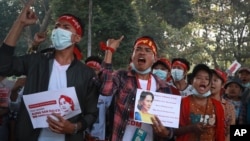Thousands of demonstrators took to the streets across Myanmar again Sunday, a day after two people were killed when police and security forces used live and rubber bullets, tear gas, water cannons and slingshots against those protesting the military’s Feb. 1 coup.
U.N. Secretary-General Antonio Guterres condemned the deadly violence. "The use of lethal force, intimidation and harassment against peaceful demonstrators is unacceptable," he said on Twitter late Saturday.
I condemn the use of deadly violence in Myanmar.
— António Guterres (@antonioguterres) February 21, 2021
The use of lethal force, intimidation & harassment against peaceful demonstrators is unacceptable.
Everyone has a right to peaceful assembly. I call on all parties to respect election results and return to civilian rule.
The U.N.’s Special Rapporteur for Myanmar, Tom Andrews, tweeted “I am horrified at more loss of life, including a teenage boy in Mandalay, as the ruling junta escalates its brutality in Myanmar. From water cannons to rubber bullets to tear gas and now hardened troops firing point blank at peaceful protesters. This madness must end, now!”
I am horrified at more loss of life, including a teenage boy in Mandalay, as the ruling junta escalates its brutality in Myanmar. From water cannons to rubber bullets to tear gas and now hardened troops firing point blank at peaceful protesters. This madness must end, now! pic.twitter.com/Z5AVV5yCDF
— UN Special Rapporteur Tom Andrews (@RapporteurUn) February 21, 2021
Twenty people were wounded in Saturday’s violence, according to the head of a volunteer emergency service, and 569 have been detained in connection with the military takeover, the Assistance Association for Political Prisoners, an activist group, said.
Early on Sunday, police arrested a famous actor, Lu Min, who had taken part in protests in Yangon and was one of six celebrities the army said were wanted under an anti-incitement law.
The army accused Lu Min of encouraging civil servants to join in the protest. If convicted, he faces a two-year prison sentence.
In a video posted on Lu Min’s Facebook page, his wife said police had come to their home in Yangon and taken him away.
"They forced open the door and took him away and didn't tell me where they were taking him. I couldn’t stop them. They didn’t tell me," Khin Sabai Oo said.
U.S. State Department spokesperson Ned Price said the United States was "deeply concerned" by reports that security forces had fired on protesters and continued to detain and harass demonstrators and others.
"We stand with the people of Burma," Price wrote on Twitter. Myanmar is also known as Burma.
We are deeply concerned by reports that Burmese security forces have fired on protestors and continue to detain and harass demonstrators and others in Burma. We stand with the people of Burma.
— Ned Price (@StateDeptSpox) February 20, 2021
Britain said it would consider further action against those involved in violence against protesters, and the French foreign ministry called the violence "unacceptable."
"The shooting of peaceful protesters in Myanmar is beyond the pale," British Foreign Secretary Dominic Raab said in a tweet. "We will consider further action, with our international partners, against those crushing democracy & choking dissent."
In a Twitter message, EU foreign policy chief Josep Borrell called on “the military and all security forces in #Myanmar to immediately stop violence against civilians.”
I strongly condemn the violence against peaceful civilian protestors by the military. I urge the military and all security forces in #Myanmar to immediately stop violence against civilians.
— Josep Borrell Fontelles (@JosepBorrellF) February 20, 2021
We will discuss on Monday #FAC the latest events in Myanmar to take appropriate decisions
EU foreign ministers are due to meet on Monday to discuss possible sanctions.
Security forces have grown increasingly aggressive against the protesters, who have clashed with Myanmar security forces since the military detained de facto leader Aung San Suu Kyi and other high-ranking officials of the civilian government nearly three weeks ago.
The military declared a one-year state of emergency, citing widespread fraud in last November’s general elections, won in a landslide by Suu Kyi’s National League for Democracy.
The military’s claims were rejected by Myanmar’s electoral commission.
Tens of thousands of demonstrators have since filled the streets of Myanmar’s biggest cities in defiance of a strict curfew and a ban on gatherings of more than four people, holding signs with pro-democracy slogans, many of them with pictures of Suu Kyi. They have raised a three-finger salute as they marched, a sign of resistance against tyranny as depicted in the popular Hunger Games movies.
In addition to protests, government employees and civil servants are on strike, resulting in disruptions to train services throughout the country. The military has ordered civil servants back to work and threatened action against them. A growing number of workers from other sectors, including medical personnel, have walked off their jobs in recent days.
Senior Gen. Min Aung Hlaing, who led the coup, promised last week in a nationally televised speech that new elections would be held to bring what he called a "true and disciplined democracy,” but he did not specify when they would take place.




